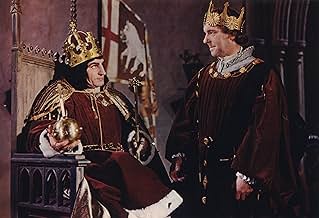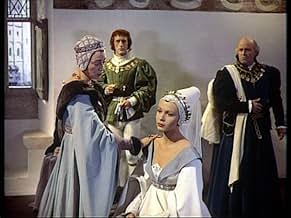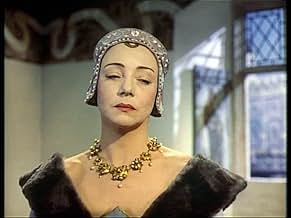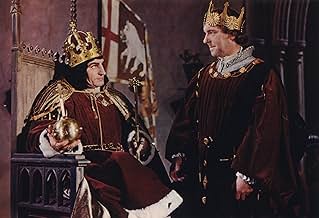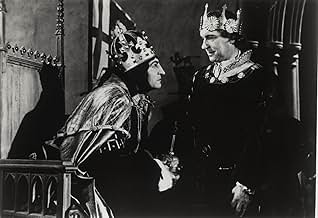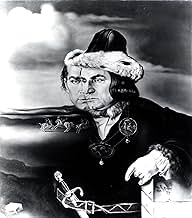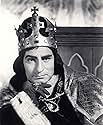Il potente racconto di Shakespeare del malvagio e deformato Re e delle sue conquiste, sia sul campo di battaglia che nella camera da letto.Il potente racconto di Shakespeare del malvagio e deformato Re e delle sue conquiste, sia sul campo di battaglia che nella camera da letto.Il potente racconto di Shakespeare del malvagio e deformato Re e delle sue conquiste, sia sul campo di battaglia che nella camera da letto.
- Regia
- Sceneggiatura
- Star
- Candidato a 1 Oscar
- 9 vittorie e 3 candidature totali
- Monk
- (as Wally Bascoe)
Recensioni in evidenza
In Richard III, Olivier constantly turns and talks to the audience with his devilish plans to ascend to the throne of England. Aided by his cousin the Duke of Buckingham (Ralph Richardson) he soon replaces King Edward IV (Cedric Hardwicke), rids himself of his other brother George (John Gielgud) and dispatches his young nephews to the tower and then brings their tender lives to a premature end.
The deformed, despicable hunchback even seduces the widow of a man he murdered for his own purposes, Lady Anne (Claire Bloom).
Once Richard ascends to the throne he finds that he has to do battle with a rival who also stakes a claim to the hollow crown.
This is a chance to see Olivier, still in his pomp speaking the Bard's verse. Unfortunately the accompanying music is too bombastic and Olivier's death scene verges on the ham.
The movie is beautiful, rich; the costumes are awesome; and the dialogue, of course, is wonderful. He patches in that great speech from Henry VI, part 3: "Why, I can smile, and murder whiles I smile . . .": and the movie wouldn't be right without it.
The other actors, Britain's elite of the time, seem to be tyrannized by the boss; and the text should have been edited better, because if you don't know the play and practically the whole history you'll get lost. Not to worry, though; the subplots here aren't really important (but they should be), and the thundering battle at the end will leave you satisfied. Special mention of Sir William Walton's music, the vibrant colors, and of course, England itself.
"Now is the winter of our discontent made glorious summer by this son of York" just seeing Richard's stooped, deformed figure hobble to the camera like some monstrous spider; to hear those bitter words delivered with such articulate power, and to be penetrated by that stony, constant glare is enough to know that this is no ordinary actor... this is a thespian whose legend will leave generations and generations of actors to come hopeless (teeth gritted) Whatever people say, Kenneth Brannagh will NOT be the next Laurence Olivier!!!
This movie has a fantastic cast: get this! Ralph Richardson AND John Geilgud AND Claire Bloom! Claire Bloom is especially exquisite and I think she plays the soulfully lamenting Lady Anne to perfection. Her scenes with Olivier are great; there is such agitation and irony between the two. I especially like it when he woos her by her husband's tomb... just goes to show how even in a tyrannical role Olivier can still steal a woman's heart with his irresistible seductiveness. She is beautiful and a most accomplished actress; I wonder why she is not better known... is Richard the only Shakespeare film she did????
Geilgud is wonderful as the doomed Clarence, done to death by the scheming Richard; my only disappointment was in Buckingham, played by Ralph Richardson. Richardson left me with a completely wrong impression of Buckingham, who (or so I learn from the play) is not all that different in character from Richard; but is scheming and devious also. Sad to say, (and I have read Olivier admits it so himself) Richardson was cast wrongly as the Duke of Buckingham... he acts too innocent and unsuspecting.
I must also give a technical comment on the camera angle; I would have preferred to be nearer Olivier at some parts of his scenes... that said, I must say I liked the scenes theatrical as such... why are other reviewers always moaning about the costumes and the settings? The costumes I liked, the settings I liked, the music by william walton was great (olivier had good taste in music though he was definitely not a musician himself) and really suited the swiftly changing reflective to agitated moods of the characters.
That said, I believe Laurence Olivier's Richard III to be (with perhaps the exception of his Henry V) the most worthily majestic film ever made in England. The greatest of course, would have been to see such a master of his incandescent talent on stage as Richard since Olivier was finest on stage live, but to be realistic, there is not much of his stage performances recorded, if any, and to be left this masterpiece that Shakespeare himself would have been proud to see performed, is a tribute to the most incredible actor of this century, and most probably, of all time.
Olivier's expertise in stage technique, married with an exceptional talent, makes for shots that last for more than a minute before the cut while he delivers the goods to camera.Set mainly in a castle ,simple but true to stage, with powerful monologues from all concerned.The dialect used is easier for the novice Shakespearian to understand than it is in some other such plays.
The ultimate treacherer who can,"add colours to the camelian and set the murderous Machiavelli to school".He makes no secret to the audience of his villainous disposition.Likewise the role makes no secret of Sir Larry's brilliance. Filled with classic lines such as,"a horse ..my kingdom for a horse!" and ,"Now is the winter of our discontent made glorious summer..." . this film ,true to Shakespeare's other work has the mixture of tragedy and comedy, historic fact meets convenient fiction with a splash of romantic betrayal.. Utterly outrageous !
Lo sapevi?
- QuizMichael Gough got his part (Dighton, the first murderer) by making a fuss to his fellow actor friends about only established stars getting cameo parts and leaving nothing for struggling actors like him. One night he got a phone call, and a voice said "You've been stirring it, haven't you? Right little shit." Gough demanded to know, "Who is this?" only to be stunned by the response, "It's Larry", which of course was Sir Laurence Olivier. Olivier was just having some fun at Gough's expense, had taken on-board his criticisms and was ringing to offer him the part of one of the murderers in this movie. When asked which one he wanted to play, Gough quickly said "Whichever one has the most lines", and he got his wish. Olivier arranged matters so that Gough's scenes were split over several days, instead of all being done in one day, so that Gough would maximize his per diem fee.
- BlooperIn the scene when Richard tells King Edward of Clarence's supposed treason, two monks are singing hymns from a large book: their lips are not only out of sync with their singing, but with each other.
- Citazioni
Richard III: I'll drown more sailors than the mermaid shall,/ I'll play the orator as well as Nestor,/ Deceive more slyly than Ulysses could,/ And, like a Sinon, take another Troy./ I can add colours to the chameleon, /Change shapes with Proteus for advantages, /And set the murderous Machiavel to school./ Can I do this,and cannot get a crown?/Tut, were it farther off,/ I'll pluck it down.
- Curiosità sui creditiMost of the film's credits are shown at the end. The opening credits show only the title of the film, William Shakespeare's name, and the names of the main actors.
- Versioni alternativeReleased in Great Britain at 155 minutes; some of the prints released in the USA are 139 minutes.
- ConnessioniFeatured in Great Acting: Laurence Olivier (1966)
I più visti
Dettagli
- Tempo di esecuzione2 ore 41 minuti
- Colore


